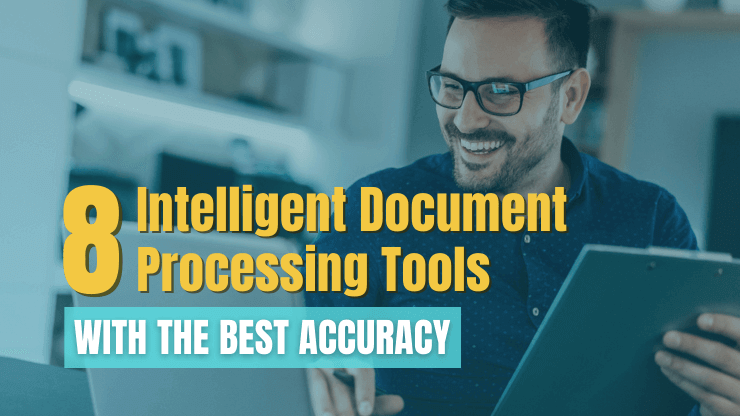In today's fast-paced business landscape, organizations are increasingly turning to intelligent document processing to streamline their document-centric workflows and unlock unprecedented levels of accuracy. Leveraging the power of AI, IDP software tools can automatically extract and process data from unstructured documents. This enables businesses to improve efficiency, accuracy, and compliance, while simultaneously extracting valuable insights from their data.
By the end of this guide, you will be equipped with the knowledge to find the right IDP solution for your business and transform your document management processes, driving greater accuracy and unlocking valuable insights from your data.
Why should businesses consider intelligent document processing (IDP) software?
Intelligent document processing (IDP) tools offer numerous benefits for businesses seeking to streamline document-based workflows, improve accuracy, and maximize efficiency. By harnessing the power of artificial intelligence and automation, IDP tools can transform how organizations handle their document processing tasks.
AI-powered intelligent document processing tools can provide your business:
- Increased accuracy: IDP tools employ advanced data extraction and validation techniques, minimizing human errors that often occur during manual data entry and document processing. With enhanced accuracy, organizations can rely on reliable data for decision-making and improve overall data quality.
- Improved productivity: Automate large-scale document processing to reduce manual document processing and increase overall productivity. When you automate document processing, your organization can seamlessly manage high document inflows, ensuring timely processing and minimizing bottlenecks.
- Cost savings: Implementing IDP solutions can lead to significant cost savings for businesses. By utilizing intelligent document processing work, organizations can reduce their reliance on manual labor, thereby minimizing associated labor costs. Additionally, the improved accuracy and efficiency of IDP tools help minimize errors and mitigate costly consequences.
- Enhanced compliance: Intelligent document processing systems equipped with redaction and compliance features assist businesses in meeting regulatory requirements and protecting sensitive data. Automated redaction ensures the removal of confidential information, while compliance features enable adherence to data privacy regulations and industry standards.
Top 8 intelligent document processing software solutions
The market for intelligent document processing tools offers a wide range of options with varying capabilities from data extraction to PII redaction. Choosing the right tool that aligns with your company’s document processing needs, accuracy requirements, budget, and team's skill level is essential. To help you embark on your search with confidence, we have curated a list of eight IDP tools that excel in automating document-based workflows.
Microsoft Syntex
A Microsoft 365 service that uses intelligent document processing, content AI and machine learning to find, organize, and classify documents within SharePoint.
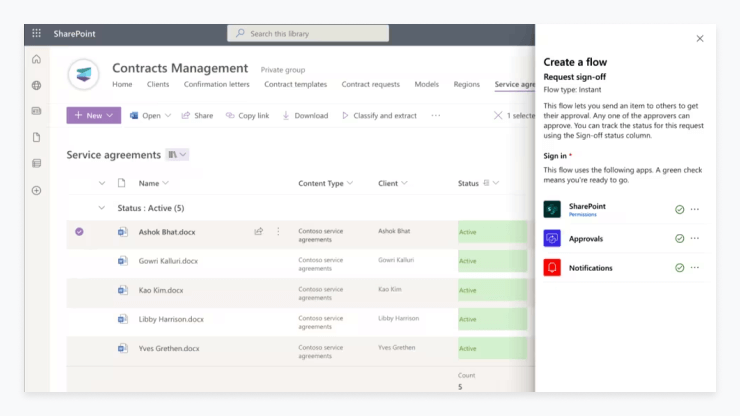
What you need to know:
- Uses pre-trained SharePoint Syntex models that can be published to one or more document libraries to automate the process of extracting document metadata
- For Microsoft PowerApps AI Builder form processing, tenants with 300 or more licensed users of Syntex will receive 1M AI Builder credits monthly, as well as access to Microsoft Dataverse
Azure Form Recognizer
Azure Applied AI service to help developers build custom intelligent document processing solutions.
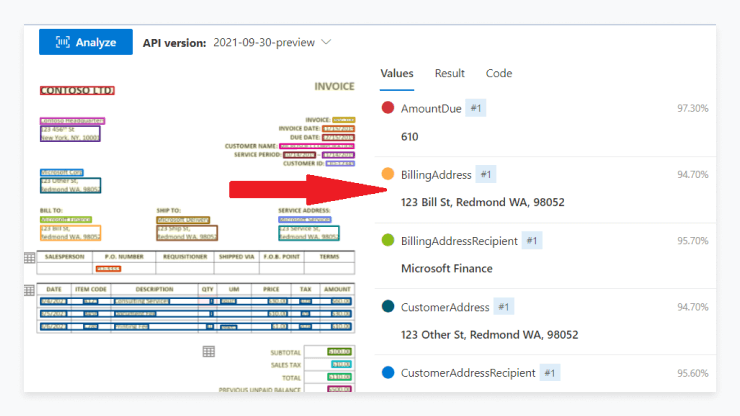
What you need to know:
- Uses machine learning-based optical character recognition (OCR) and document understanding technologies to extract text, tables, structure, and key-value pairs from scanned documents
- Various models are available for processing documents such as US IRS W-2s, invoices, receipts, and business cards
- Teams can label and train custom models to perform data extraction from structured, semi-structured, and unstructured documents
Document AI from Google
AI document analysis tool that allows teams to parse, split, and analyze unstructured and structured data from all types of documents like PDF and images.
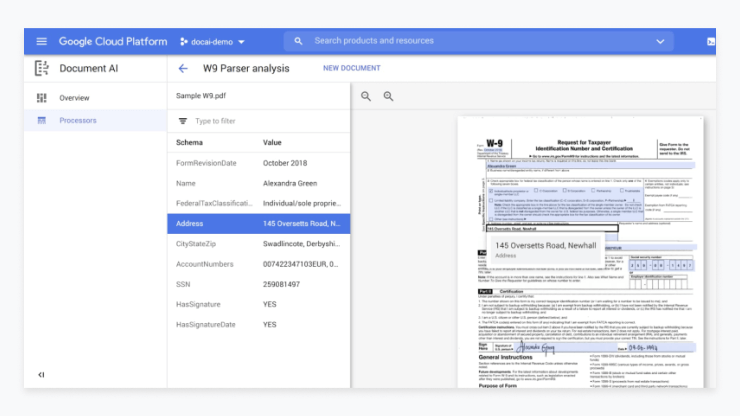
What you need to know:
- Document AI Workbench can be used to create new, custom models as well as to up-train existing ones
- Document AI Warehouse can be used to search and store documents
- Teams can use OCR to digitize text from documents, process industry-specific documents, as well as create custom models and data extractors
Datakeen
Automation platform for intelligent document processing, customer review management, and video monitoring.

What you need to know:
- Tools available to verify document authenticity and translate data into structured databases
- Companies can manage their customer relationships by using the intelligent suggested responses to Google emails and online reviews
- Intelligent vision capabilities can be used to increase the capabilities of surveillance cameras, supply chain management and quality control
Super.AI
IDP solution that utilizes LLM, machine learning models, and human workflows to break down complex processing tasks more efficiently.
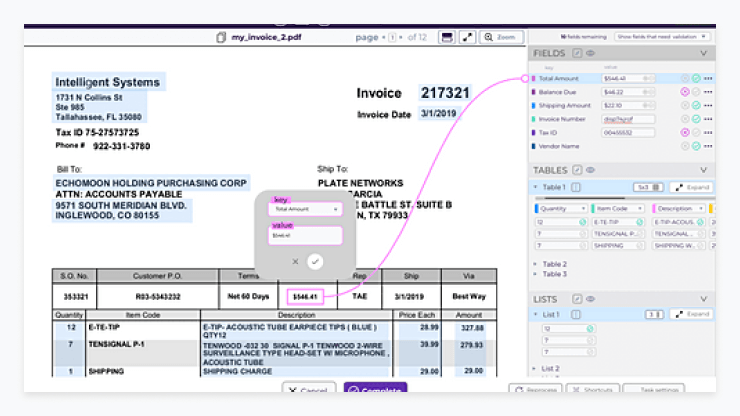
What you need to know:
- Users can define their own trade-offs between quality, cost, and speed
- The Data Processing Crowd is a curated workforce available for hire on demand to execute data labeling, post-processing, and exception handling
- Connectors available for manual and API-based document upload and download
Rossum
IDP tools designed to automate end-to-end business workflows, reduce manual data entry errors, and improve productivity.
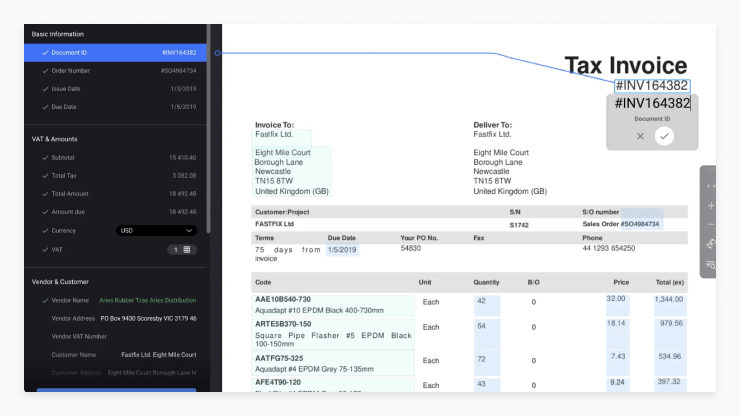
What you need to know:
- Automated data capture tool can help reduce data entry errors
- Tool is designed to read business documents like a human would, adapting to changes in style and formatting as it goes
- Pre-built extensions available along with the ability for teams to develop custom automations using a low-code interface
Amazon Comprehend
Natural language processing (NLP) service that uses machine learning to uncover insights and connections in text.
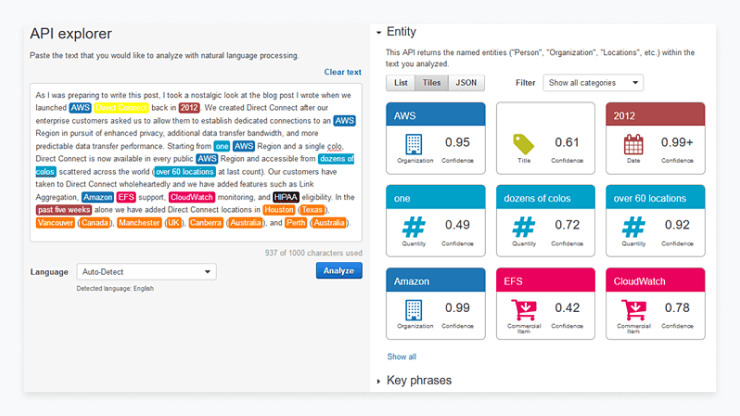
What you need to know:
- Built to analyze documents, customer support tickets, product reviews, emails, social media feeds, and more.
- Can extract text, key phrases, topics, and sentiment from documents
- Identifies and redacts PII from documents
IBM Watson Discovery
NLP AI platform that automates content analysis to find answers and insights that are buried in repositories of business documents.
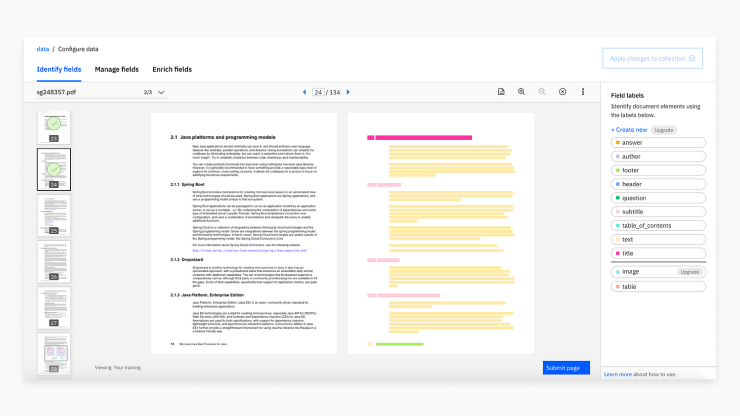
What you need to know:
- After integration with a chatbot, it can respond to human-posed questions to give teams insights gleaned from vast repositories of business documents
- Can search structured and unstructured documents in formats like PDF, HTML, tables, images, and websites
What can IDP software be used for?

As we have seen, there are a wide range of IDP tools on the market. To find the right tool for your business, you should be really clear on what business needs you are trying to fill. Do you need to streamline basic document processing tasks? Improve the processing accuracy of traditionally manual work? Extract insights from vast repositories of data?
Review the following key applications of IDP tools to aid in the process of identifying your key goals and what you expect out of an IDP tool:
- Data extraction: IDP tools excel in leveraging artificial intelligence to automate document-based workflows and extract valuable information from unstructured data, such as invoices, contracts, forms, and receipts. By leveraging machine learning and natural language processing, these tools can accurately identify and extract key information, eliminating the need for manual data entry and significantly improving efficiency.
- Document classification: IDP tools with document classification capabilities can automatically categorize and sort documents based on extracted data. This enables organizations to streamline their AI document management processes by routing documents to the appropriate departments or workflows, reducing manual effort and ensuring documents are processed efficiently.
- Automated workflows: IDP tools integrate with workflow management systems to automate document-centric business processes. By defining rules and triggers, these tools can initiate actions such as document routing, approvals, and notifications, eliminating manual intervention and accelerating overall processing time.
- Redaction and compliance: IDP tools equipped with redaction capabilities help organizations ensure compliance with privacy regulations and protect sensitive information. These tools automatically identify and remove confidential data from documents, such as personally identifiable information (PII), enabling organizations to safeguard data privacy and meet regulatory requirements.
- Analytics and reporting: IDP tools often provide analytics and reporting functionalities to gain insights into document-centric processes. By analyzing data patterns, performance metrics, and processing times, businesses can identify bottlenecks, measure efficiency, and make data-driven decisions to optimize workflows and improve overall productivity.
Conclusion
In today's digital era, IDP solutions, powered by AI and machine learning, provide a robust toolset for businesses to automate document workflows, enhance accuracy, and drive efficiency. In this guide we have highlighted the top IDP tools, aiding businesses in selecting the right solution to revolutionize their document management processes.
If you're looking for help developing a custom AI solution, our team can help you put together a comprehensive AI strategy and guide you through the development process. Reach out to our team today!

